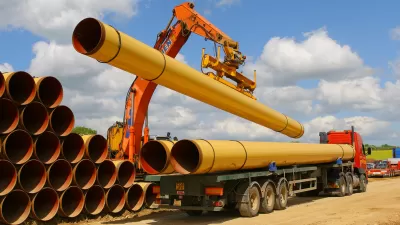The young prime minister's approval to almost triple the capacity of the Kinder Morgan pipeline comes as a surprise given Trudeau's concern for climate change. He approved another Alberta oil sands pipeline but rejected a third.

"In a decision that will almost surely prompt showdowns with environmentalists, indigenous groups and some political allies, Prime Minister Justin Trudeau of Canada approved on Tuesday [Nov. 29] the expansion of a pipeline linking the oil sands in Alberta to a tanker port in British Columbia," reports Ian Austen for The New York Times.
The Kinder Morgan Trans Mountain project will increase the capacity of a 53-year-old pipeline to 890,000 barrels a day from 300,000 and expand the tanker port.
Environmental groups began condemning the decision as Mr. Trudeau was making his announcement late Tuesday afternoon, but the prime minister said that the pipeline expansion did not contradict his pledges to improve environmental protection and mitigate climate change.
"Prime Minister Justin Trudeau of Canada promised to make climate change a priority when he campaigned for office last year," editorialized The New York Times in October. Also that month, he "announced plans for a national price for carbon emission," posted Casey Brazeal, over the objections of representatives from provinces that don't already price carbon.
The approval comes on top of the approval of the Enbridge's Line 3 pipeline, which, like the Kinder Morgan pipeline, would transport oil sands crude, though to Wisconsin for export, reports Maria Gallucci for Yahoo! Sports.
He rejected a third pipeline, Northern Gateway, which the prime minister said "wasn’t in the best interests of affected communities."
The Northern Gateway pipeline, also proposed by Enbridge, Inc., would have hauled "Alberta bitumen from Edmonton, Alberta to Kitmat, B.C. (and) was backed by the government of Alberta Province as well as Canada's Prime Minister Stephen Harper," notes a 2013 post, but it was rejected by the British Columbia government. See Enbridge's statement on the federal government's actions on both projects.
Trudeau had forecasted his rejection of the Northern Gateway in 2015 when he indicated he would ban oil tanker traffic from British Columbia's North Coast.
"Before Mr. Trudeau’s announcement [on Tuesday], some opponents of the Kinder Morgan pipeline predicted that its approval would lead to protests on the scale of the anti-pipeline demonstrations now underway at the Standing Rock Sioux Reservation in North Dakota," adds Austen.
However, the news of the two approvals was received very differently by the oil industry, as one would expect. "Prime Minister Justin Trudeau delivered some desperately needed good news for the Canadian oil patch on Tuesday," reported Todd Coyne for Alberta Oil Magazine.
FULL STORY: Justin Trudeau Approves Oil Pipeline Expansion in Canada

Planetizen Federal Action Tracker
A weekly monitor of how Trump’s orders and actions are impacting planners and planning in America.

Maui's Vacation Rental Debate Turns Ugly
Verbal attacks, misinformation campaigns and fistfights plague a high-stakes debate to convert thousands of vacation rentals into long-term housing.

Restaurant Patios Were a Pandemic Win — Why Were They so Hard to Keep?
Social distancing requirements and changes in travel patterns prompted cities to pilot new uses for street and sidewalk space. Then it got complicated.

In California Battle of Housing vs. Environment, Housing Just Won
A new state law significantly limits the power of CEQA, an environmental review law that served as a powerful tool for blocking new development.

Boulder Eliminates Parking Minimums Citywide
Officials estimate the cost of building a single underground parking space at up to $100,000.

Orange County, Florida Adopts Largest US “Sprawl Repair” Code
The ‘Orange Code’ seeks to rectify decades of sprawl-inducing, car-oriented development.
Urban Design for Planners 1: Software Tools
This six-course series explores essential urban design concepts using open source software and equips planners with the tools they need to participate fully in the urban design process.
Planning for Universal Design
Learn the tools for implementing Universal Design in planning regulations.
Heyer Gruel & Associates PA
JM Goldson LLC
Custer County Colorado
City of Camden Redevelopment Agency
City of Astoria
Transportation Research & Education Center (TREC) at Portland State University
Jefferson Parish Government
Camden Redevelopment Agency
City of Claremont



























